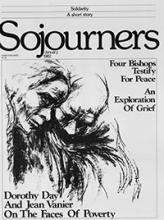Editor’s update: In February 2020, L'Arche International released a report detailing an investigation that found Jean Vanier "engaged in manipulative sexual relationships with at least 6 adult (not disabled) women," and was aware of sexual abuses against women committed by his mentor, Fr. Thomas Philippe. For additional reporting and commentary on this news, visit sojo.net/jean-vanier.
I live with 10 men and women who are very poor. None of them can talk; only six can walk. All of them have a very limited level of understanding. But each one has a heart. Each one has a real need for tenderness, love, and a stable relationship with another person. These men and women are weak and fragile. Most of them have passed through many different hands in their lives. They are almost constantly on the borderline of deep insecurity and anguish. It is difficult for me when I sense their anguish and know my incapacity to respond to it. Children who are loved and cared for by their mothers and fathers know deep security. They sense that in their fragility they are loved. They are not afraid. But children who have never known these privileged, stable relationships stemming from love that is freely given—who have only known aggressiveness and abandonment—these children live in depression: "I am worth nothing!" "I am only a source of anguish and anger for others!" "I am no good!" They blame themselves.
Read the Full Article

